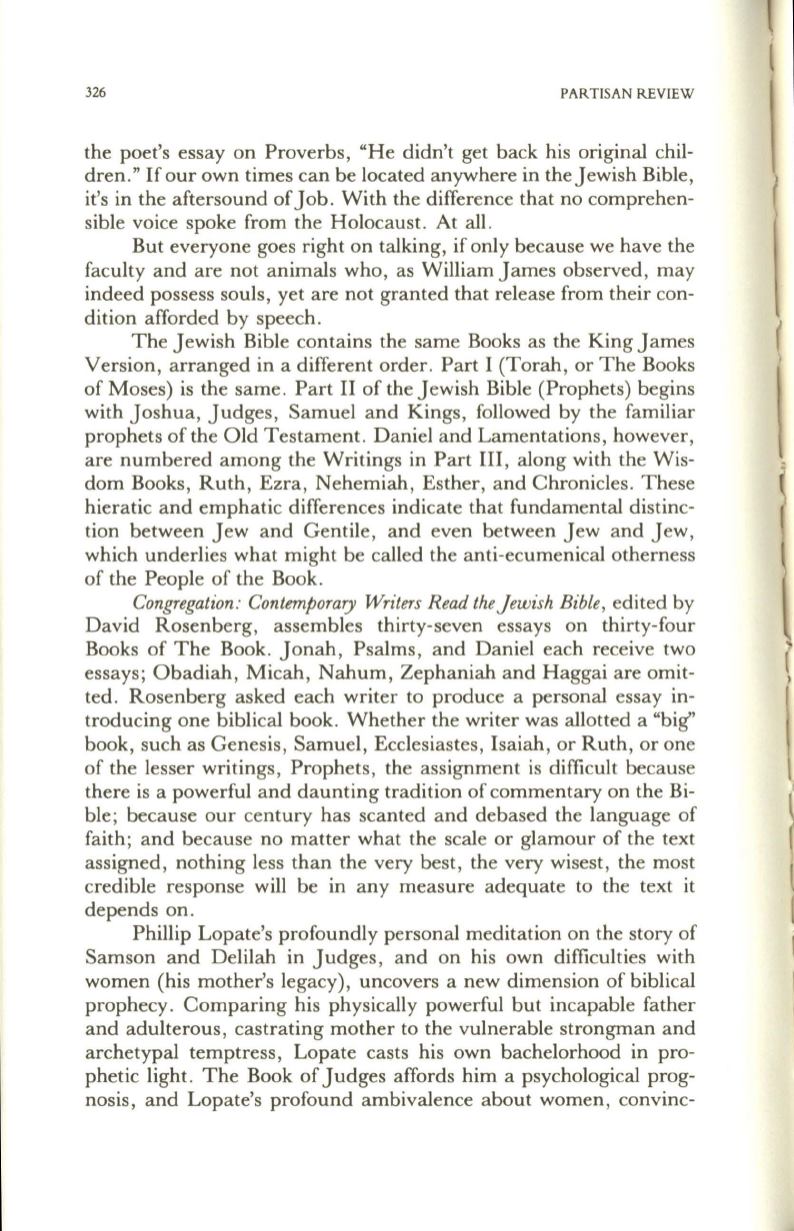
326
PARTISAN REVIEW
the poet's essay on Proverbs, "He didn't get back his original chil–
dren ."
If
our own times can be located anywhere in the Jewish Bible,
it's in the aftersound ofJob. With the difference that no comprehen–
sible voice spoke from the Holocaust. At all.
But everyone goes right on talking, if only because we have the
faculty and are not animals who, as William James observed, may
indeed possess souls, yet are not granted that release from their con–
dition afforded by speech.
The Jewish Bible contains the same Books as the King James
Version, arranged in a different order. Part I (Torah, or The Books
of Moses) is the same. Part II of the Jewish Bible (Prophets) begins
with Joshua, Judges , Samuel and Kings, followed by the familiar
prophets of the Old Testament. Daniel and Lamentations, however,
are numbered among the Writings in Part III, along with the Wis–
dom Books, Ruth , Ezra , Nehemiah , Esther, and Chronicles. These
hieratic and emphatic differences indicate that fundamental distinc–
tion between Jew and Gentile, and even between Jew and Jew,
which underlies what might be called the anti-ecumenical otherness
of the People of the Book.
Congregation : Contemporary Writers Read theJewish Bible,
edited by
David Rosenberg, assembles thirty-seven essays on thirty-four
Books of The Book. Jonah, Psalms, and Daniel each receive two
essays; Obadiah, Micah, Nahum, Zephaniah and Haggai are omit–
ted . Rosenberg asked each writer to produce a personal essay in–
troducing one biblical book. Whether the writer was allotted a "big"
book, such as Genesis, Samuel, Ecclesiastes, Isaiah, or Ruth, or one
of the lesser writings , Prophets, the assignment is difficult because
there is a powerful and daunting tradition of commentary on the Bi–
ble ; because our century has scanted and debased the language of
faith ; and because no matter what the scale or glamour of the text
assigned, nothing less than the very best, the very wisest, the most
credible response will be in any measure adequate to the text it
depends on .
Phillip Lopate's profoundly personal meditation on the story of
Samson and Delilah in Judges , and on his own difficulties with
women (his mother's legacy) , uncovers a new dimension of biblical
prophecy . Comparing his physically powerful but incapable father
and adulterous, castrating mother to the vulnerable strongman and
archetypal temptress, Lopate casts his own bachelorhood in pro–
phetic light. The Book of Judges affords him a psychological prog–
nosis, and Lopate's profound ambivalence about women , convinc-
(


